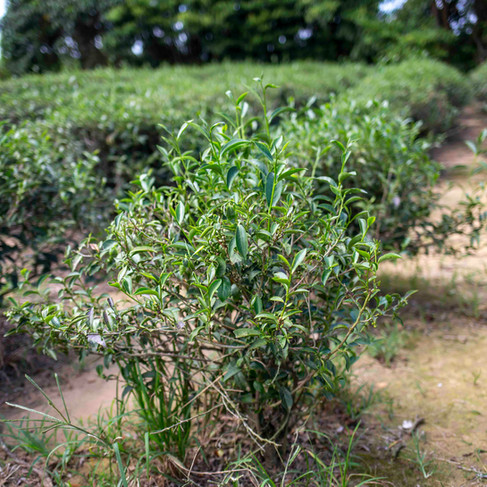Pink Luk meets our ye fang Eastern Beauty farmer Master Yuping in Emei Shan, Miaoli, Taiwan

Today, in commemoration of Women's Day 2024, I am delighted to present a Q&A interview with a respected figure in the world of tea cultivation: Master Yuping, a distinguished female tea farmer hailing from Taiwan's Emei Shan region. With over three decades of expertise as an independent tea artisan, Master Yuping represents the third generation of her esteemed tea-making tradition, mainly known for producing Eastern Beauty 東方美人, aka Oriental Beauty bug-bitten wulong tea. Her deep understanding of ye fang cha 野放茶, coupled with her innovative approach to tea crafting, has earned widespread acclaim.
Amidst Taiwan's early industrialization in the 1970s, Master Yuping's decision to return to her family's tea gardens demonstrated her ability to anticipate and adapt to changes. While her peers moved towards city life, she recognized the inherent value of preserving her family's tea heritage. In an era when tea leaves bitten by insects were often considered inferior, Master Yuping embraced their nuanced qualities, recognizing that such leaves imparted unique aromas and flavors, as well as enhanced health benefits — a revelation that laid the groundwork for her pioneering work in the field.

Yuping's Yefang wild tea garden in Emei Shan, Miaoli county, Taiwan
Q: Can you elaborate on your journey in mastering the art of crafting Eastern Beauty (Dong Fang Mei Ren 東方美人)?
I met a very experienced teacher and studied with him for 5 years. He was a highly renowned tea master since the Japanese colonial era, where he was invited by tea farmers from all over Taiwan, to Pinglin, Taitung, Tainan, etc. Although my mentor was not good at explaining verbally, his profound knowledge served as an invaluable source of wisdom, which I was determined to preserve, therefor I wrote down his insights onto paper.
By the time my teacher passed away, I had been encountering obstacles in making tea, so I decided to reorganize all the notes I’d taken over the past five years. I came out with 23 distinct methodologies for crafting Eastern Beauty 東方美人, each dependent on different factors, such as leaf bite intensity, picking time, and oxidation levels.
Some leaves are severely bitten, some are bitten a little bit, some are not bitten at all, some are picked in the morning, some are picked in the afternoon, some are picked on rainy days, some are picked on windy day. The degree of leaf bite is also different from the degree of subsequent oxidation. The equipment used can vary from charcoal, air-conditioning room, and dryer. Under these different factors, I have compiled the 23 most basic processes for eastern beauty, which I still follow until today.
Left: Yuping's notes on our Jinxuan Eastern Beauty; Right: Eastern Beauty tasting at Yuping's tea house
Q: In the competitive environment where customers can enjoy so many options of tea in Taiwan, how do you find your own path between commercial and artistic trade-offs?
Instead of making a large number of different tea varieties to suit the market, it is better for me to stick to my own creation. I choose to let go of the world’s perspective that Eastern Beauty should look or taste like this or that, and instead do it my way, the way I’ve been developing for 3 over decades.
Because my tea garden is wild and organic the state of the tea leaves is already very different, especially now that the terroir is different and unstable due to climate changes. When I enter the tea farm, I am able to see clearly what the essence of tea is, and decide to make the best out of it, what’s the best for the leaves. Only then I decide which direction to take, what method I should use. It’s not necessarily have to be Eastern Beauty, it can turn out to be a completely different tea, maybe a new experiment like Emei Cocktail was back in winter 2019.
For example, if the tea leaves are not bitten deeply, I will make wulong tea with light withering, but if the sun is very strong and the tea leaves are bitten by insects, I will probably use 攪拌, the light stirring method of Eastern Beauty. Sometimes, before the drying process, I may even use heavy roasting. The nature of wild tea leaves is unstable and always changing, you have to adjust the process and adapt. That’s the magic of ye fang.
Left: 20 years aged Oriental Beauty; Right: Comparing different Emei Cocktails
Q: With the tea industry in Taiwan mainly focused on commercial products, what motivated you to choose your own values and artistic direction?
I used to compete with my tea in tea competition before, for ten years. I won many awards and earned my reputation, but I remember one day, a Japanese tea enthusiast heard my story in Taiwan and made a special trip to Taiwan to meet me. After tasting my tea all morning, he decided not to buy anything. Right before leaving he told me: “Your tea is delicious and fragrant, but it has no soul”.
After he left, I couldn’t make tea properly for the next three years. It took me time to realize it wasn’t only the pesticides I was using, but also the way I followed for more than a decade after the criteria of the color, taste, and appearance of the tea liquid 茶湯 (tea soup) the tea should have. After that, I began to improve the soil of my tea gardens so that the tea leaves would have good contents. I converted completely organic, and later ye fang with hardly any interference with the plants. Nature is very hard to control and it can’t change overnight, but I was patient with putting all my heart in the process.
Jinxuan cultivar No.12 in Yefang growing method at Yuping's tea garden
Q: What are your thoughts on the rise of organic tea gardens in Taiwan and the blurred definition of "organic tea" in the industry?
When it comes to organic tea, it's not just about following rules; it's about your intentions. It should come from your heart. If your concept is organic, the tea you make will be organic. I know some farmers just try to meet the standards without truly caring. They don’t really care about making tea the natural way, it doesn’t come from their heart.
Postscript

I have known Yuping for two years now. When I first met her, her ease and chill aura deeply attracted me. I wondered how much experience I would have to go through to reach this point. Throughout the visit, I gained another level of understanding about the master personality and how it reflects on her work as a tea maker, and eventually her tea. Perhaps tea is a way to practice the truth of life. As a female tea maker, she uses different angles to understand things. Through her energy, I feel the deep respect and admiration to nature, which inspire and encourage me to continue my own path as a teacher and tea curator focusing on natural, organic ye fang methods.
We will meet Yuping in person for a masterclass during our up coming Tea Culture & Culinary Tour to Taiwan this coming June 2024, in one of the highlights of our program dedicated entirely to Taiwanese ye fang wild tea growing.













Comentarios